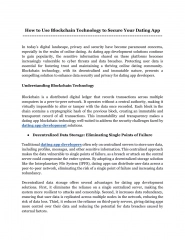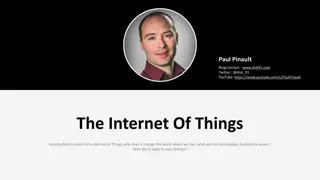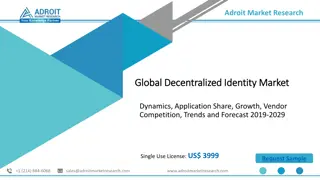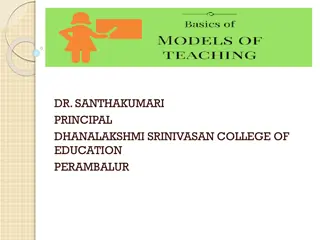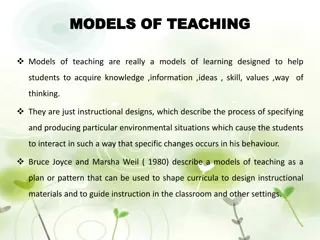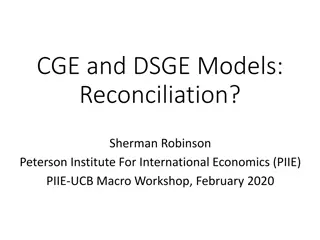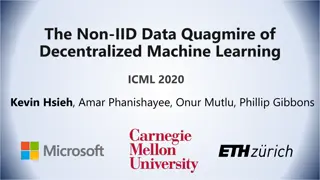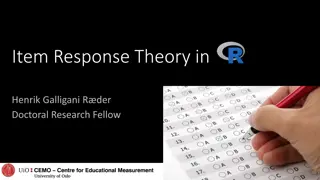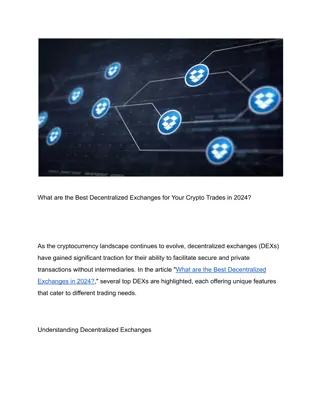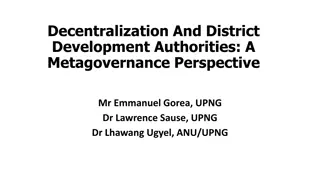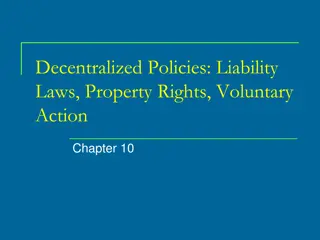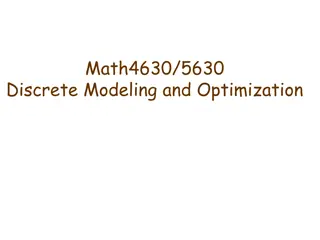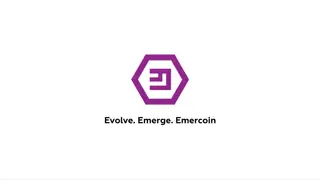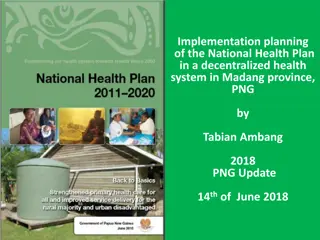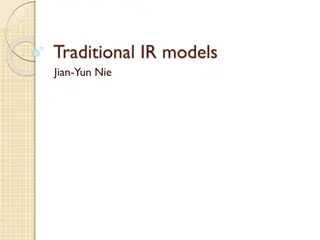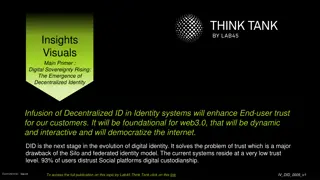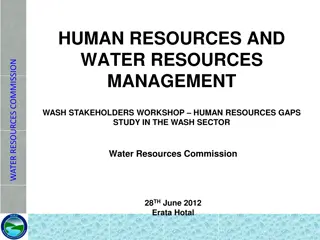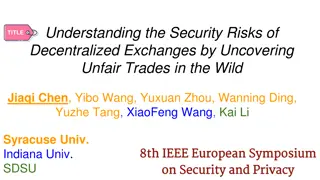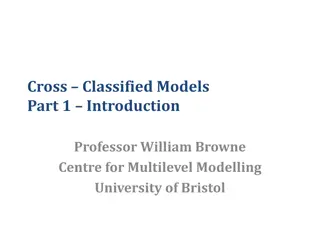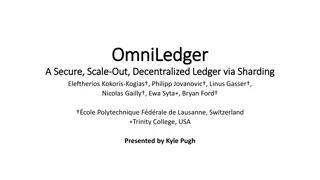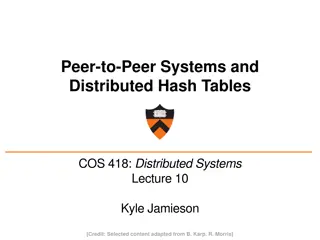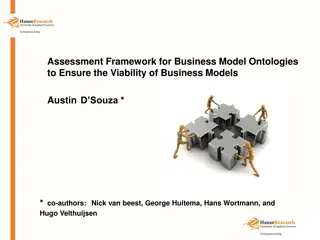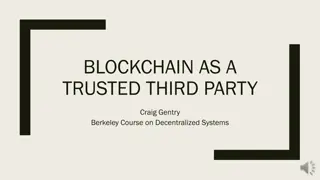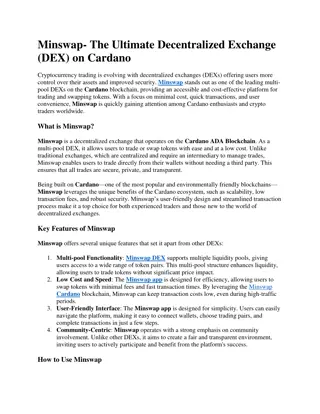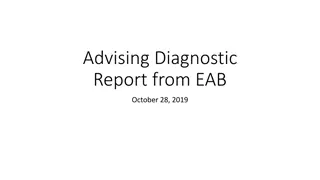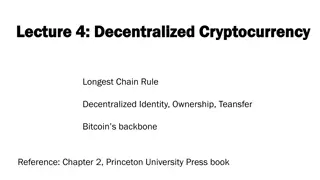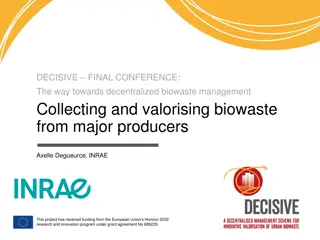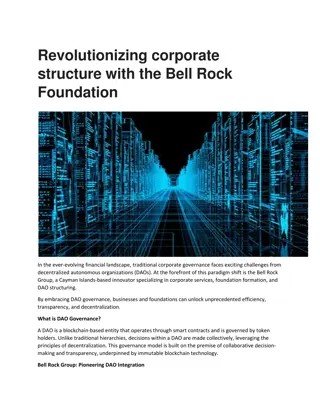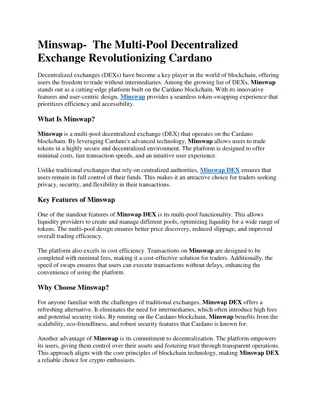How to Use Blockchain Technology to Secure Your Dating App Data
Discover the transformative power of blockchain technology in securing data for dating app development solutions. Eliminate single points of failure with decentralized storage, boosting redundancy. Ensure immutable integrity, preventing unauthorized modifications to user data. Facilitate secure mess
1 views • 4 slides
Global Climate Models
Scientists simulate the climate system and project future scenarios by observing, measuring, and applying knowledge to computer models. These models represent Earth's surface and atmosphere using mathematical equations, which are converted to computer code. Supercomputers solve these equations to pr
3 views • 15 slides
Explore Market-Up: The Decentralized Marketplace on Blockchain Technology
Market-Up is a decentralized marketplace leveraging blockchain technology, smart contracts, and TRON cryptocurrency for voucher creation, sales, and payments. Users can participate in marketing programs, attract customers, and earn income securely and transparently. Activate your account to join thi
1 views • 16 slides
System Models in Software Engineering: A Comprehensive Overview
System models play a crucial role in software engineering, aiding in understanding system functionality and communicating with customers. They include context models, behavioural models, data models, object models, and more, each offering unique perspectives on the system. Different types of system
2 views • 33 slides
Understanding Input-Output Models in Economics
Input-Output models, pioneered by Wassily Leontief, depict inter-industry relationships within an economy. These models analyze the dependencies between different sectors and have been utilized for studying agricultural production distribution, economic development planning, and impact analysis of i
8 views • 7 slides
Exploring Helium: A Decentralized IoT Network Revolution
Delve into the world of Helium, a blockchain-based IoT network revolutionizing connectivity. Managed by a community of crypto investors, this global network offers innovative solutions for telecom industry challenges through decentralized deployment and mining of HNT tokens.
0 views • 17 slides
Decentralized Identity Market size, share and forecast analysis 2019–2029
\nAdroit Market Research has included the Global Decentralized Identity Market\u00a0 research to its database in order to provide a thorough analysis of the variables driving a general market growth trend. The study contains a lot of information and is a useful tool for professionals in the field.
0 views • 5 slides
Understanding Models of Teaching in Education
Exploring different models of teaching, such as Carroll's model, Proctor's model, and others, that guide educational activities and environments. These models specify learning outcomes, environmental conditions, performance criteria, and more to shape effective teaching practices. Functions of teach
2 views • 20 slides
Understanding Models of Teaching for Effective Learning
Models of teaching serve as instructional designs to facilitate students in acquiring knowledge, skills, and values by creating specific learning environments. Bruce Joyce and Marsha Weil classified teaching models into four families: Information Processing Models, Personal Models, Social Interactio
1 views • 28 slides
Significance of Models in Agricultural Geography
Models play a crucial role in various disciplines, including agricultural geography, by offering a simplified and hypothetical representation of complex phenomena. When used correctly, models help in understanding reality and empirical investigations, but misuse can lead to dangerous outcomes. Longm
0 views • 8 slides
Understanding CGE and DSGE Models: A Comparative Analysis
Explore the similarities between Computable General Equilibrium (CGE) models and Dynamic Stochastic General Equilibrium (DSGE) models, their equilibrium concepts, and the use of descriptive equilibria in empirical modeling. Learn how CGE and DSGE models simulate the operation of commodity and factor
4 views • 15 slides
Tackling Skewed Data Challenges in Decentralized Machine Learning
Addressing the critical issue of skewed data in decentralized machine learning, this work explores solutions to effectively handle non-iid data distribution, focusing on communication bottlenecks, data skewness, and proposing innovative approaches for decentralized learning over skewed datasets.
0 views • 26 slides
Enhancing Information Retrieval with Augmented Generation Models
Augmented generation models, such as REALM and RAG, integrate retrieval and generation tasks to improve information retrieval processes. These models leverage background knowledge and language models to enhance recall and candidate generation. REALM focuses on concatenation and retrieval operations,
1 views • 9 slides
Understanding Item Response Theory in Measurement Models
Item Response Theory (IRT) is a statistical measurement model used to describe the relationship between responses on a given item and the underlying trait being measured. It allows for indirectly measuring unobservable variables using indicators and provides advantages such as independent ability es
2 views • 32 slides
What are the Best Decentralized Exchanges for Your Crypto Trades in 2024?
As the cryptocurrency landscape continues to evolve, decentralized exchanges (DEXs) have gained significant traction for their ability to facilitate secure and private transactions without intermediaries. In the article \"What are the Best Decentrali
0 views • 5 slides
Decentralization and District Development Authorities: A Metagovernance Perspective
The study explores the impact of District Development Authorities (DDAs) on Papua New Guinea's decentralized governance system. It focuses on metagovernance issues such as coordination, leadership, and conflict resolution within the decentralized framework. The introduction, approach, and analysis p
0 views • 14 slides
Decentralized Policies and Liability Laws in Environmental Protection
Explore the concept of decentralized policies in managing environmental pollution, focusing on liability laws, property rights, and voluntary actions. Discover how decentralized approaches offer advantages in addressing environmental externalities and how liability laws can change incentives for pol
1 views • 37 slides
Understanding Discrete Optimization in Mathematical Modeling
Discrete Optimization is a field of applied mathematics that uses techniques from combinatorics, graph theory, linear programming, and algorithms to solve optimization problems over discrete structures. This involves creating mathematical models, defining objective functions, decision variables, and
0 views • 12 slides
Revolutionizing Communication with ENUMER: A Decentralized Approach
Traditional telephone systems rely on a chain of PSTN providers for call routing, leading to issues such as multiple re-codings and extra fees. ENUMER, a decentralized version of ENUM, offers a faster, more reliable, and cost-effective solution by allowing direct paths from buyer's PBX to seller, by
0 views • 12 slides
Implementation Planning of National Health Plan in Decentralized Health System, Madang Province, PNG
National Health Plan (NHP) is a crucial policy document for the health sector in Papua New Guinea, outlining government policy directions and priority areas for planning and service delivery. This study by Tabian Ambang in 2018 focuses on investigating the implementation planning of NHP in a decentr
0 views • 17 slides
Implementing Digital Product Passports: Best Practices and Standards Overview
This content provides insights into implementing Digital Product Passports (DPP) using decentralized identity standards. It includes key projects and partnerships focusing on identity and supply chain ecosystems, showcasing the benefits of a decentralized approach. The report emphasizes the importan
0 views • 8 slides
Establishment of Decentralized Clean Water Service Providers in Winooski Basin
The Clean Water Service Delivery Act of 2019 aims to establish a network of decentralized Clean Water Service Providers (CWSPs) for watersheds in Lake Champlain and Lake Memphremagog basins. CVRPC serves as the CWSP for the Winooski Basin, overseeing projects like stormwater management, natural reso
0 views • 5 slides
Observational Constraints on Viable f(R) Gravity Models Analysis
Investigating f(R) gravity models by extending the Einstein-Hilbert action with an arbitrary function f(R). Conditions for viable models include positive gravitational constants, stable cosmological perturbations, asymptotic behavior towards the ΛCDM model, stability of late-time de Sitter point, a
1 views • 12 slides
Understanding Wireless Propagation Models: Challenges and Applications
Wireless propagation models play a crucial role in characterizing the wireless channel and understanding how signals are affected by environmental conditions. This article explores the different propagation mechanisms like reflection, diffraction, and scattering, along with the challenges and applic
1 views • 14 slides
Understanding Information Retrieval Models and Processes
Delve into the world of information retrieval models with a focus on traditional approaches, main processes like indexing and retrieval, cases of one-term and multi-term queries, and the evolution of IR models from boolean to probabilistic and vector space models. Explore the concept of IR models, r
0 views • 65 slides
Decentralized Identity: Enhancing Trust in Web3.0 with DID
The emergence of Decentralized Identity (DID) is set to revolutionize digital identity systems by enhancing end-user trust, solving trust issues in current models, and paving the way for Web3.0. DID prevents forgery, eliminates passwords, and boosts operational efficiency. However, key obstacles lik
0 views • 5 slides
Water Resources Commission Overview and Operations
This document provides an overview of the Water Resources Commission (WRC), focusing on training needs assessment objectives, staff strength, professional capacity, organizational structure, and decentralized operations. The WRC plays a key role in managing water resources, with a diverse team of pr
0 views • 7 slides
Uncovering Security Risks in Decentralized Exchanges
This study explores the security risks associated with decentralized exchanges (DEX) by investigating unfair trades that occur in these platforms. Through analyzing various scenarios, the research sheds light on potential vulnerabilities that traders may face in DEX environments. Key findings highli
0 views • 20 slides
Understanding Cross-Classified Models in Multilevel Modelling
Cross-classified models in multilevel modelling involve non-hierarchical data structures where entities are classified within multiple categories. These models extend traditional nested multilevel models by accounting for complex relationships among data levels. Professor William Browne from the Uni
0 views • 13 slides
OmniLedger: Decentralized Ledger with Sharding
OmniLedger is a decentralized ledger using sharding to enhance scalability without compromising security. It addresses challenges such as validator selection, cross-shard transactions, and checkpointing. The proposed solution includes ByzCoinX for consensus and Atomix for atomic commit. Goals includ
0 views • 13 slides
Overview of Peer-to-Peer Systems and Distributed Hash Tables
The lecture discusses Peer-to-Peer (P2P) systems and Distributed Hash Tables, exploring their architecture, benefits, adoption in various areas, and examples such as BitTorrent. It covers the decentralized nature of P2P systems, the challenges they address, and the advantages they offer including hi
0 views • 56 slides
Assessing Business Model Ontologies for Sustainable Business Viability
This research delves into the assessment framework for business model ontologies to ensure the sustainability and viability of business models. It focuses on embedding decentralized energy supply within a combined energy infrastructure to create new business models. The study aims to identify the mo
0 views • 21 slides
Exploring the Role of Blockchain as a Trusted Third Party in Decentralized Systems
Blockchain technology serves as a decentralized and cryptographic Trusted Third Party (TTP) by enhancing trust, immutability, and censorship resistance in transactions. By distributing trust and utilizing cryptographic protocols, blockchain mitigates the need for a centralized authority, offering a
0 views • 30 slides
Understanding Composite Models in Building Complex Systems
Composite models are essential in representing complex entities by combining different types of models, such as resource allocation, transport, and assembly models. Gluing these models together allows for a comprehensive representation of systems like the milk industry, where raw materials are trans
0 views • 27 slides
Minswap- The Ultimate Decentralized Exchange (DEX) on Cardano
Minswap- The Ultimate Decentralized Exchange (DEX) on Cardano
0 views • 2 slides
Enhancing Advising Practices at ETSU: A Diagnostic Report
EAB's diagnostic report on advising at ETSU identified opportunities to improve the student advising experience. Key observations included a decentralized structure leading to inconsistent experiences, highlighting the need for a more standardized advising model. Recommendations proposed a decentral
0 views • 20 slides
Decentralized Cryptocurrency and Blockchain Technology
Exploring the concepts of decentralized cryptocurrency, the longest chain rule, ownership transfer, and ScroogeCoin within the context of blockchain technology. Detailed explanations on creating coins, transactions, blocks, and the formation of a tamper-resistant blockchain. The centralization aspec
0 views • 15 slides
Decentralized Biowaste Management for Sustainable Resource Valorization
The Decisive Final Conference presented a project focusing on decentralized biowaste management to collect and valorize biowaste from major producers. The project aimed to address challenges in biowaste processing and resource recovery. Key aspects included the difference between planned and actual
0 views • 13 slides
Bellrock Group - DAO-Enabled Foundations: Empowering Decentralized Governance
Bellrock Group specializes in DAO-enabled foundations, offering legal and organizational frameworks that support decentralized autonomous organizations' growth and success. Our expert team helps DAOs navigate the complexities of governance, liability
1 views • 2 slides
Minswap- The Multi-Pool Decentralized Exchange Revolutionizing Cardano
Minswap- The Multi-Pool Decentralized Exchange Revolutionizing Cardano
0 views • 4 slides
